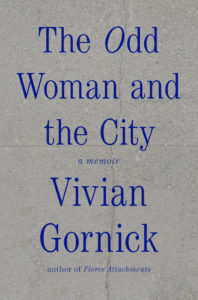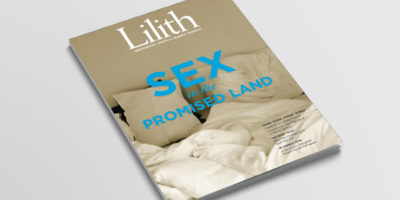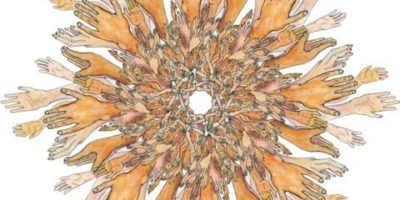Literature, Loneliness and the Urban Landscape
 I read The Odd Woman and the City (FSG, $22), the new memoir by essayist and critic Vivian Gornick, while pushing my double stroller through the streets of Jerusalem in the August heat, trying to walk my toddler twins to sleep. Structured as a sequence of dialogues, vignettes, memories, and observations, Gornick’s latest offering captures both herself and her city, evoking the eeriness that pervaded New York City in the wake of 9/11, the stalwart patience of the men in line at the soup kitchen in her neighborhood, her conversations with strangers sitting one table over in the coffee shops where she sits and writes. As I read about her exchanges with beggars, loners, shopkeepers, and bus drivers — quotidian interactions which often take a surprisingly profound turn — I was transported back to Gornick’s New York, but also to the city of Thomas Wolfe, Charles Reznikoff, and Evelyn Scott, whose work she brings to life in this insightful, penetrating survey of literature, loneliness, and the urban landscape.
I read The Odd Woman and the City (FSG, $22), the new memoir by essayist and critic Vivian Gornick, while pushing my double stroller through the streets of Jerusalem in the August heat, trying to walk my toddler twins to sleep. Structured as a sequence of dialogues, vignettes, memories, and observations, Gornick’s latest offering captures both herself and her city, evoking the eeriness that pervaded New York City in the wake of 9/11, the stalwart patience of the men in line at the soup kitchen in her neighborhood, her conversations with strangers sitting one table over in the coffee shops where she sits and writes. As I read about her exchanges with beggars, loners, shopkeepers, and bus drivers — quotidian interactions which often take a surprisingly profound turn — I was transported back to Gornick’s New York, but also to the city of Thomas Wolfe, Charles Reznikoff, and Evelyn Scott, whose work she brings to life in this insightful, penetrating survey of literature, loneliness, and the urban landscape.
Gornick’s 20 years of friendship with her gay friend Leonard, also a solitary New Yorker, form the backbone of the book, serving as a springboard for her reflections on friendship and intimacy. She contrasts their friendship with the famous but short-lived literary partnership between Wordsworth and Coleridge, drawn to one another because they felt like their own best selves in each other’s presence. “Today we do not look to see, much less affirm, our best selves in one another. To the contrary, it is the openness with which we admit to our emotional incapacities — the fear, the anger, the humiliation — that excites contemporary bonds of friendship. Nothing draws us closer to one another than the degree to which we
face our deepest shame openly in one another’s company.”
Gornick makes us her intimate in no small part because of what she is prepared to confess to us on the page. In exposing the city, she exposes herself, not in the long form of autobiography but in Wordsworthian spots of time. We become privy to the melancholy of her Chekhovian childhood, in which her mother lay on a couch in a darkened room, lamenting her loneliness to anyone who would listen; the men she mistakenly and briefly married; the urgency she felt upon turning 60. In paging through her memories, I was suddenly awash with one of my own — I recalled how I felt my own heart pulsing in her prose when I was back in high school, studying alone in the library and coming across this paragraph from Approaching Eye Level — reproduced in this memoir — on her principled renunciation of romantic love: “As the years went on, I saw that romantic love was injected like dye into the nervous system of my emotions, laced through the entire fabric of longing, fantasy, and sentiment. It haunted the psyche, was an ache in the bones… it hurt the eyes to look directly into its influence… I have prized my hardened heart — I have prized it all these years — but the loss of romantic love can still tear at it.” I handed my daughter her water bottle and thought about how puerile it all seemed to me now that romantic love has been eclipsed by hunger, by helplessness, by the love we cannot help but shower on those to whom we
are everything.
Eventually my girls fell asleep, and I could stop pushing the stroller and sit down on a park bench to read. I was immersed in Gornick’s conversations with derelicts and doormen when an older woman tapped me on the shoulder and told me to turn my stroller around — the sun was on my sleeping daughters’ legs, and I should not let them burn. “If you’ve grown up in New York,” Gornick writes, “your life is an archaeology not of structures, but of voices, also piled one on top of another, also not really replacing one another.” They are too much in the sun, I thought, and I would finish the page and then turn them around, reminded of the many differences between New York and Jerusalem.
Ilana Kurshan works in book publishing in Jerusalem.



